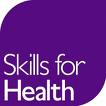Page Contents
National Occupational Standards for complementary therapies are developed and published by Skills for Health.
Skills for Health is the Health Sector Skills Council, for all health employers; NHS, independent and third sector.
They serve the sector in three ways:
- firstly, by offering tested solutions and tools to help you improve productivity and quality
- secondly, by directly supporting you and your staff to plan and manage workforce development and change
- thirdly, as the employers’ authoritative voice on skills issues, they represent your views and champion the effective investment in skills that you need.

Skills for Health was relicensed in 2009 following a review by the National Audit Office with an ‘outstanding’ contribution to workforce redesign. The UK Commission for Employment and Skills (UKCES) was responsible for the relicensing process for the 25 Sector Skills Councils. UKCES closed in 2017.
As the Health Sector Skills Council, Skills for Health acts as the voice of healthcare employers in the skills system.
There are many changes taking place in how healthcare including complementary medicine is provided in the UK.
Read the National Occupational Standards (NOS) Governance Group Five Year Plan
What are National Occupational Standards (NOS)?
NOS describe the skills, knowledge and understanding needed to undertake a particular task or job to a nationally recognised level of competence. They focus on what the person needs to be able to do, as well as what they must know and understand to work effectively.
They cover the key activities undertaken within the occupation in question under all the circumstances the job holder is likely to encounter.
What are the benefits of NOS?
NOS are tools to help individuals, organisations and training providers to improve performance. They are useful for carrying out a wide range of activities some of which are described below.
- They describe the minimum standard to which an individual is expected to work in a given occupation
- Set out a statement of competence which bring together the skills, knowledge and understanding necessary to do the work
- Provide managers with a tool for a wide variety of workforce management and quality control
- Offer a framework for training and development
- Form the basis of Vocational Qualifications (VQs) on the Qualification and Credit Framework (QCF) and Scottish Vocational Qualifications (SVQs).
Skills for Health have worked together with GRCCT and other experts from the sector to develop an extensive range of competences/National Occupational Standards (NOS) in a range of complementary therapies.
Currently published National Occupational Standards and incorporated competencies for GRCCT regulated disciplines may be found using the Skills for Health Competence Search Tools
Details on the work of Skills for Health and further details of competencies can be obtained at http://www.skillsforhealth.org.uk/
Or
Skills for Health, 4th Floor, 1 Temple Way, Bristol, BS2 0BY
Telephone 0117 922 1155
